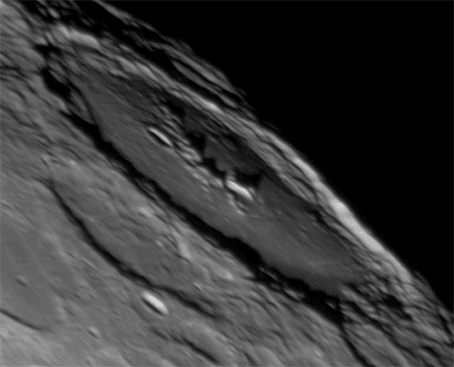
image by Павел Пресняков (Pavel Presnyakov), Kiev Ukraine
The eye and brain make a marvelous observing instrument. Together they can concentrate on moments of ultra-stable seeing to capture tiny or subtle detail. In the last few years webcams and software have duplicated that ability, producing the amazing images that grace LPOD. But today’s LPOD goes one further, doing something that only video can easily do - capture a series of images to document sunset on a feature of interest. In Pavel’s animated gif image we see 28 frames as the shadows of the crater rim and central peaks lengthen across Humboldt on the eastern limb. It is interesting to watch a patch of floor on the limbward side of the peaks remain illuminated while all around it darkens. This is the sort of temporary illumination effect that has given rise to reports of lunar transient phenomena in the past. With the time for each of these images (in Comments below) the LTVT software could be used to measure the lengths of the shadows, perhaps deducing if there is a rise of the center of the floor as there is at Petavius. I’d like to see more videos like this, whose moving shadows give new information on topography.
Technical Details:
Dec 5, 2006. 10″ TAL-250K Klevtsov 1:8.5 + 2X Celestron Ultima + Philips 840. Processed with Registax V4 and final process in Photoshop CS2, 1 align point, stack of 500 frames. Animated gif made with 28 frames.
Related Links:
Rükl chart
Astropolis website<a /a>
</a>
COMMENTS?
Click on this icon File:PostIcon.jpg at the upper right to post a comment.



